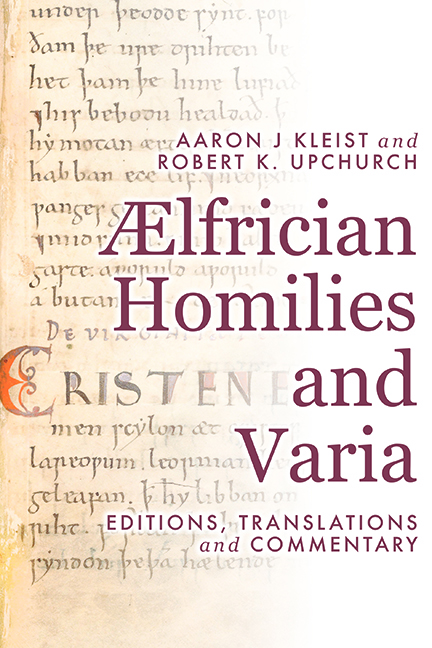Book contents
- Frontmatter
- Contents
- Preface
- Acknowledgements
- Abbreviations
- Sigla for Cited Ælfrician Manuscripts
- Dates for Cited Ælfrician Works
- Editorial Conventions
- Conventions Used in the Commentaries
- Homilies The Proper of the Season
- Homilies The Proper of the Saints
- Ælfrician Homilies and Varia: Editions, Translations, and Commentary: Volume II
- Homilies The Common of the Saints
- Homilies Unspecified Occasions
- Varia
- Works Cited
- Index
- ANGLO-SAXON TEXTS
1 - Christmas: Sermo in natale Domini et de ratione anime (‘A Sermon on the Lord's Nativity and the Nature of the Soul’)
Published online by Cambridge University Press: 05 March 2024
- Frontmatter
- Contents
- Preface
- Acknowledgements
- Abbreviations
- Sigla for Cited Ælfrician Manuscripts
- Dates for Cited Ælfrician Works
- Editorial Conventions
- Conventions Used in the Commentaries
- Homilies The Proper of the Season
- Homilies The Proper of the Saints
- Ælfrician Homilies and Varia: Editions, Translations, and Commentary: Volume II
- Homilies The Common of the Saints
- Homilies Unspecified Occasions
- Varia
- Works Cited
- Index
- ANGLO-SAXON TEXTS
Summary
The Sermo in natale Domini et de ratione anime (‘A Sermon on the Lord's Nativity and the Nature of the Soul’) is one of six sermons that Ælfric wrote for Christmas Day over the course of his career. It is the only Latin sermon among them and was second in order of composition, having been composed after Ælfric completed the First Series of Catholic Homilies in 989 but before he sent the series to Sigeric, archbishop of Canterbury, in 991. Rather than expound the Gospel story of the Nativity as he did in the First Series (CH I.2), however, Ælfric offers spiritual instruction concerning the fundamental tenets of an orthodox faith.
The first part of the Sermo deals largely with the Trinity and the nature of the Creator [lines 1–99], while the second discusses the nature of the created soul [lines 100–205]. The instruction in part one initially sounds an admonitory note, addressing the antitrinitarian belief that the Son is not coeternal with the Father and is thus inferior to him [lines 5–17]. This error prompts a defense of the coeternality and consubstantiality of the Trinity, and a warning to the audience not to search too high for things that exceed human reason [lines 18–30]. Ælfric does not suggest, however, that Christians should not think. Rather he puts within reach a knowledge of the Trinity whose distinctiveness as a Creator without beginning and end can be comprehended in the orders of created beings [lines 31–62], all of whom have a beginning and some of whom – angels and humans – have no end [lines 31–48]. The Sermo argues that humans, as rational beings who walk upright, ought to think on heavenly things lest they become like animals that take no notice of God and fight among themselves [lines 62–70]. Taking the Eucharist, says Ælfric, prompts Christians to take notice of Christ, who was born once in humanity but is repeatedly incarnated in the hearts of those who love truth and strive for peace [lines 71–99]. From orthodoxy and comportment, Ælfric turns in part two to a consideration of the soul, a knowledge of which explains human existence, one's purpose and ultimate end [lines 100–2].
- Type
- Chapter
- Information
- Ælfrician Homilies and VariaEditions, Translations, and Commentary, pp. 3 - 104Publisher: Boydell & BrewerPrint publication year: 2022

